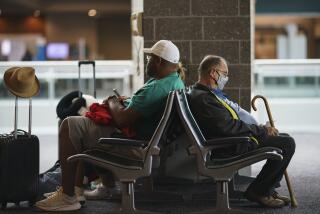EXECUTIVE TRAVEL
- Share via
* Name: Sikoki Layton
* Position: Flight attendant
* Company: United Airlines
As an international flight attendant for almost 17 years, I have had the good fortune to see much of this fascinating and diverse planet. However, making several trips each month to some distant corner of the world can also take its toll on the body and mind. Crossing countless time zones, going from one season to the opposite and being cooped up with hundreds of strangers with all their idiosyncrasies and germs--all as you hurl through space in a steel tube--can definitely have an adverse effect on an otherwise normal and healthy individual.
Over the years, I have discovered my own arsenal of weapons against jet lag.
The first secret weapon is exercise. My advice is to have a regular exercise program that you do at home that can be modified to go with you when you travel. Even just simple stretches, yoga or running in place can help ward off the effects of jet lag if they’re part of your daily routine at home.
I carry a small cassette player in my tote bag with Jane Fonda’s advanced workout on tape, and I have sweated and groaned with Jane all over the world! In her Feb. 16 article, Carol Smith described some excellent in-flight exercises to keep you from getting “saddle sores” and to help your circulation while on the airplane. One reason the flight attendants sometimes arrive feeling better than the passengers after a long trip is that we’ve been up and moving about during the flight.
My second suggestion is to take vitamins. Eating can be irregular during travel, and in some destinations it’s sometimes risky to eat fresh fruits and vegetables, so a supplement couldn’t hurt.
One of the contributing factors to jet lag is dehydration. The aircraft environment is much drier than any place you might call home--even the desert. For this reason, I recommend drinking a glass of water every hour you’re in flight. The dry air also wreaks havoc on your skin, so a good moisturizer is a necessity. Sometimes a little Vasoline or Mentholatum inside the nose keeps your sinuses from getting dried out as well. Chapstick or lip balm is helpful, and sucking on a cough drop during those long night flights will often keep your mouth and throat from getting so parched. (My favorites are the sugarless N’ICE lozenges.)
As part of my regular fitness program, I avoid alcohol, tobacco and caffeine and highly encourage any traveler to do the same.
*
My fifth secret is to think in terms of the time zone where you’re headed, not the one you’re coming from. I always tell the passengers, “It’s only what time it is where you are--not where you were!” The sooner your mind can convince your body it’s in a new time zone, the sooner you’ll adjust.
And lastly, be willing to take naps. When you arrive in Hong Kong or Frankfurt, ask yourself, “How do I feel?” If the answer is “Exhausted,” first look at the local time (your watch should already be set to it), count how many hours before your normal bedtime and take a nap for half of it. That way you’ll get up in the afternoon with time to get acquainted with your new surroundings, have dinner and go to bed at your normal bedtime there, regardless of what time it might be at home. Chances are you’ll wake up the next morning right on schedule with the locals. Never hesitate to take a short siesta. On your return flight, use the same technique.
More to Read
Sign up for The Wild
We’ll help you find the best places to hike, bike and run, as well as the perfect silent spots for meditation and yoga.
You may occasionally receive promotional content from the Los Angeles Times.






